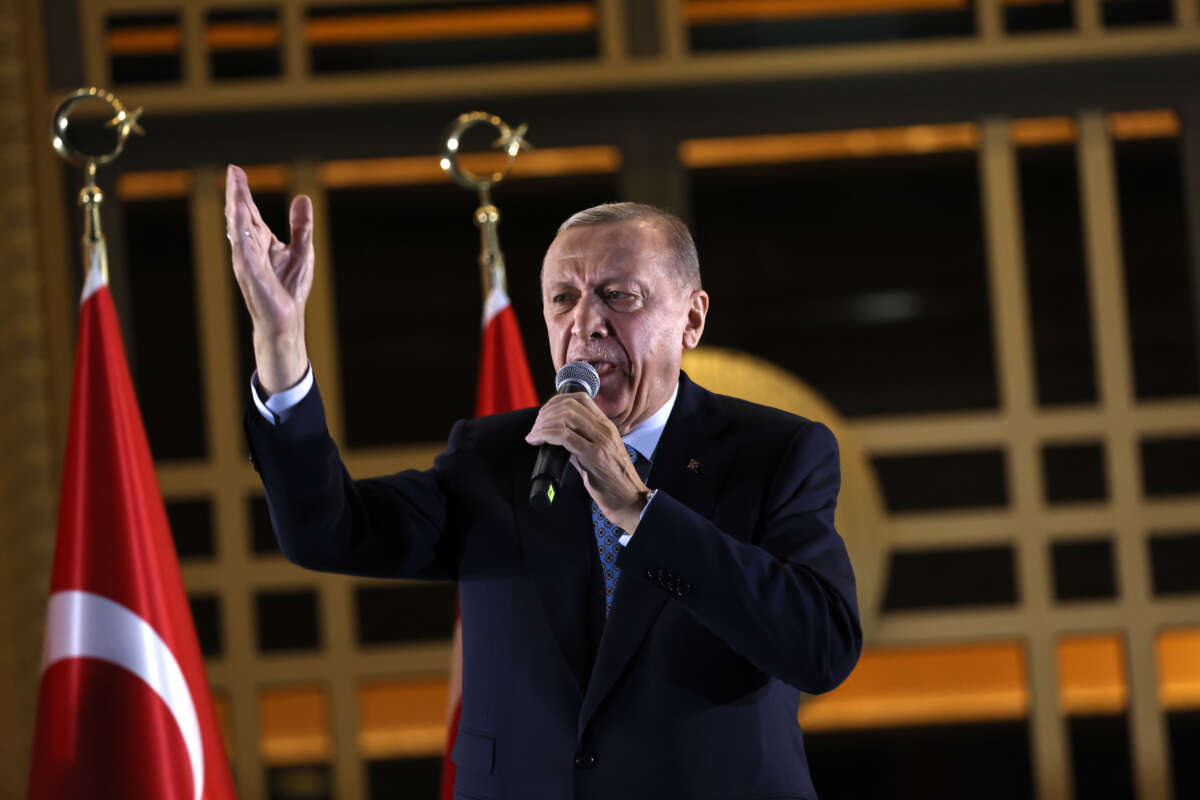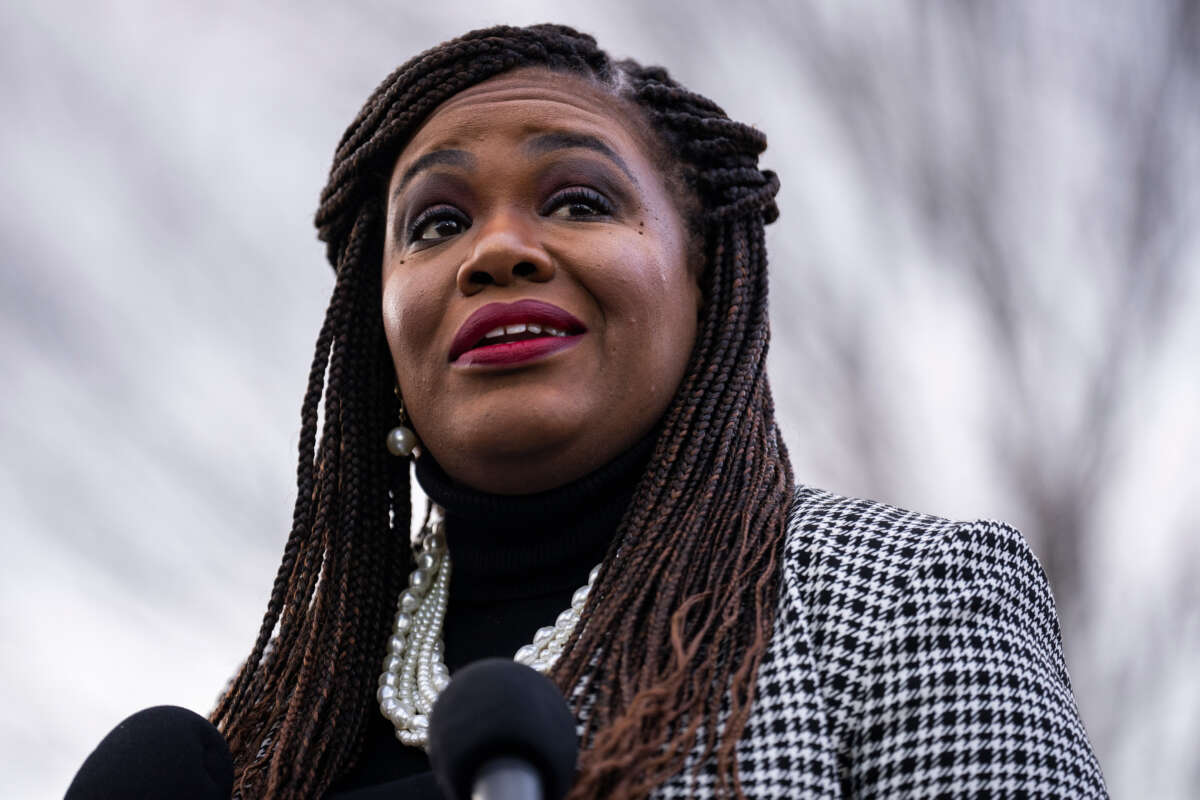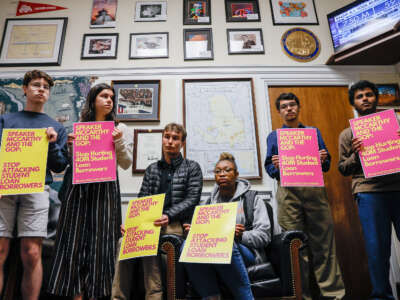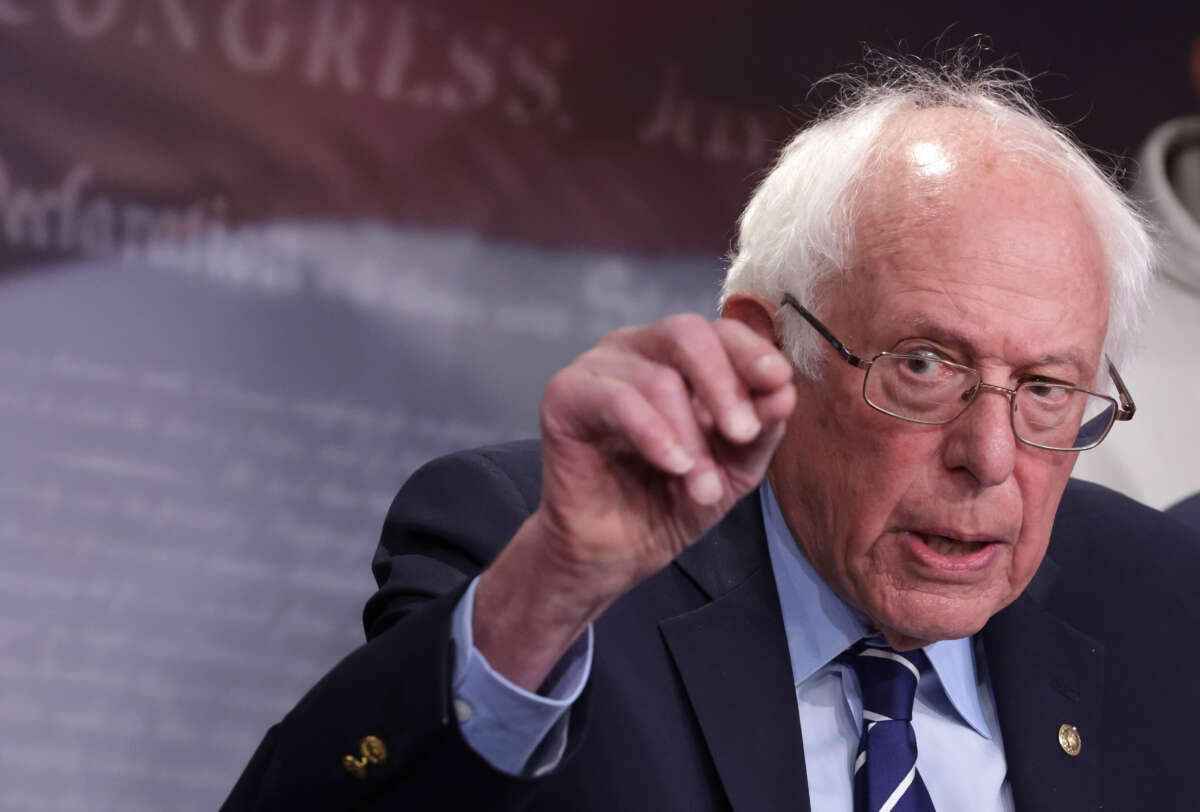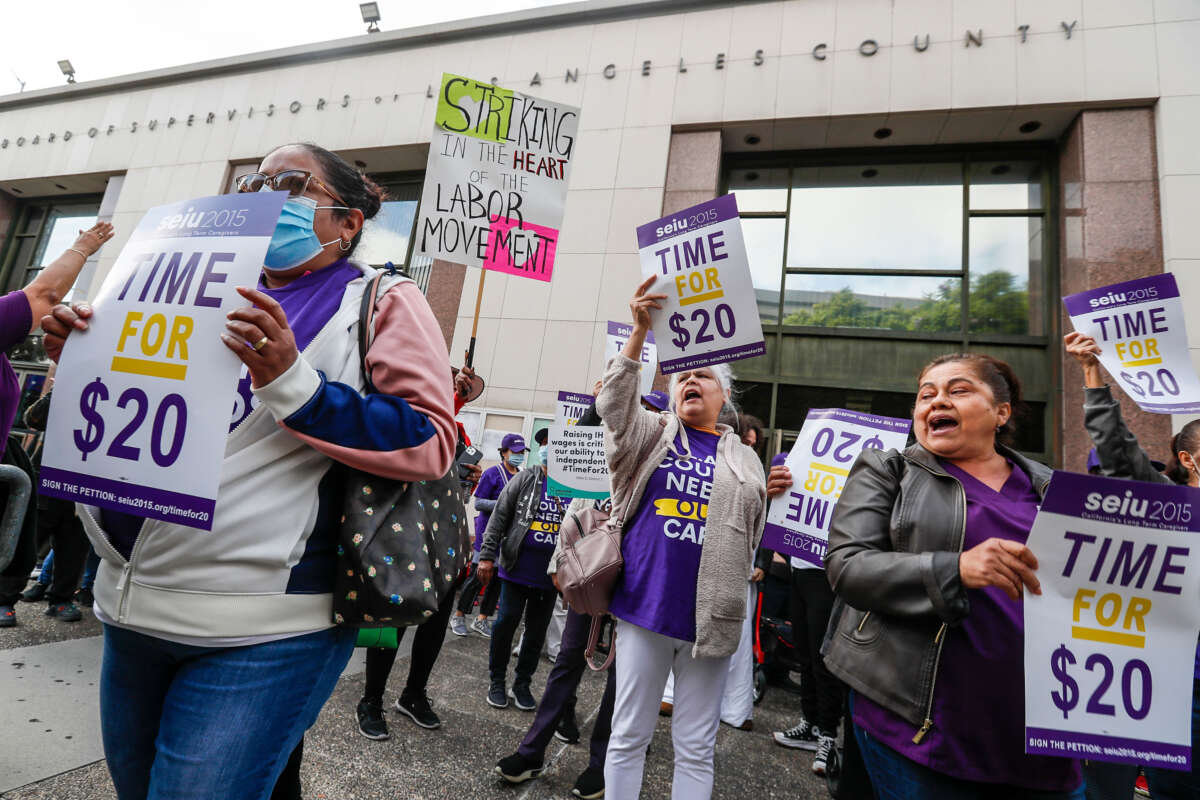These humanitarian tragedies have become opportunities for rapid growth and high profits for corporate predators.
By Daniel Falcone ,
Published April 21, 2023

A car drives past collapsed buildings in Antakya, Turkey, on February 20, 2023.
YASIN AKGUL / AFP VIA GETTY IMAGES
Honest, paywall-free news is rare. Please support our boldly independent journalism with a donation of any size.
In early February, Turkey and Syria were both rocked by devastating earthquakes. Since then, the two nations have dealt with a series of destructive aftershocks, serious economic woes, currency challenges, and increasing poverty and unemployment. Underscoring a further relevant human rights dilemma was Turkey’s demand for cooperation from Sweden and Finland with respect to control of Kurdish exile activity in exchange for supporting NATO membership, a concern somewhat lessened by Turkish willingness to end its opposition to Finland joining NATO.
In this exclusive interview for Truthout, international relations expert Richard Falk discusses both the importance of institutional responses as well as the instances of poor infrastructure built in the pursuit of profit. Falk emphasizes the political and international dimensions of the changing circumstances in Syria and Turkey, as well as the pertinence of the Russo-Ukrainian War and the major global players related to the ongoing crisis, especially Iran and Russia.
Daniel Falcone: Some of the recent research and reporting has referred to the recent tragic events in Turkey and Syria in terms of a reshaping of politics between the two nations. Can you comment on what this means for both countries in the short and long terms?
Richard Falk: Both Turkey and Syria are facing difficult internal challenges as of late, accentuated by the massive earthquake devastations of February 6, 2023, and the ensuing days of damaging aftershocks, but reflecting long-existing conditions centering on economic decline, expressed by way of severe inflation, sharply falling foreign currency exchange rates, and the hardships resulting from unemployment and poverty, especially being experienced at the lower end of class structures.
Both countries face crises in leadership and are governed autocratically. Both societies are polarized, and the opposition regards them as tyrants. Turkey retains the rituals of procedural democracy, up to now maintaining surprisingly free elections and high expectations that a peaceful transfer of power will occur should the opposition prevail — as it well might if current polls are indicative — in the forthcoming elections scheduled to take place on May 14.
RELATED STORY
Honest, paywall-free news is rare. Please support our boldly independent journalism with a donation of any size.
In early February, Turkey and Syria were both rocked by devastating earthquakes. Since then, the two nations have dealt with a series of destructive aftershocks, serious economic woes, currency challenges, and increasing poverty and unemployment. Underscoring a further relevant human rights dilemma was Turkey’s demand for cooperation from Sweden and Finland with respect to control of Kurdish exile activity in exchange for supporting NATO membership, a concern somewhat lessened by Turkish willingness to end its opposition to Finland joining NATO.
In this exclusive interview for Truthout, international relations expert Richard Falk discusses both the importance of institutional responses as well as the instances of poor infrastructure built in the pursuit of profit. Falk emphasizes the political and international dimensions of the changing circumstances in Syria and Turkey, as well as the pertinence of the Russo-Ukrainian War and the major global players related to the ongoing crisis, especially Iran and Russia.
Daniel Falcone: Some of the recent research and reporting has referred to the recent tragic events in Turkey and Syria in terms of a reshaping of politics between the two nations. Can you comment on what this means for both countries in the short and long terms?
Richard Falk: Both Turkey and Syria are facing difficult internal challenges as of late, accentuated by the massive earthquake devastations of February 6, 2023, and the ensuing days of damaging aftershocks, but reflecting long-existing conditions centering on economic decline, expressed by way of severe inflation, sharply falling foreign currency exchange rates, and the hardships resulting from unemployment and poverty, especially being experienced at the lower end of class structures.
Both countries face crises in leadership and are governed autocratically. Both societies are polarized, and the opposition regards them as tyrants. Turkey retains the rituals of procedural democracy, up to now maintaining surprisingly free elections and high expectations that a peaceful transfer of power will occur should the opposition prevail — as it well might if current polls are indicative — in the forthcoming elections scheduled to take place on May 14.
RELATED STORY

Syria and Turkey’s Earthquake Reminds Us That Disasters Are Inherently Political
There is no natural disaster untouched by politics, capitalism and racism.
By Shireen Akram-Boshar ,
February 18, 2023
Syria makes no pretense of being a democratic society, and its legitimacy is a major persisting grievance of opposition forces that fought for control of the governing process for a decade after 2011. Syria is internally preoccupied with a difficult recovery from this prolonged intense civil strife and it still lacks control in some portions of its national territory — a continuing combat zone either governed by Kurdish forces as a separate political entity or Turkish forces in some borderland areas. During the years of combat some four million Syrians sought and found refuge in Turkey. Major foreign interventions were undisguised on both sides, on behalf of the insurgent opposition by the U.S., Turkey, Saudi Arabia and UAE, and on behalf of the government by Iran and Russia. Israel remains concerned with the extension of Iranian influence and military presence in Syria and continues to carry out frequent air attacks directed at targets allegedly associated with the Iranian military presence.
Turkey and Syria had developed a positive relationship before the Arab Spring in 2010-11, so much so that it became the poster child of Ahmet Davutoglu’s “zero problems with neighbors,” while he acted as Turkey’s foreign minister. However, when Damascus harshly repressed anti-regime protests and implemented no concessions to popular demands for greater freedom, relations quickly deteriorated. Syria accused Turkey of backing an Islamic Brotherhood Syrian political organization of Sunni orientation, which had long been seeking to replace the Shi’ite dynastic rule headed by the al-Assad family. Politically, and to some extent militarily, both Turkey and the U.S. supported the opposition throughout the decade of civil strife, partly on counterterrorist grounds and partly, in Turkey’s case, due to concerns about a radical Kurdish minority that was operating from Syria, and in the U.S. case, concerns about the spread of Iranian and Russian influence. The opposition, including Turkey, underestimated the capabilities and loyalty of the Syrian armed forces to engage effectively with the opposition, misled by the apparent ease of achieving regime change in Libya in 2011. The Syrian internal struggle is a long controversial story in which both sides miscalculated at various stages the outcome of the challenge to the Bashar al-Assad government.
At this point the atmosphere in the region is changing in some dramatic ways that seem to be weakening the U.S. role as guarantor of regional stability. Both Turkey and Syria have strong incentives to end their hostility and to address cooperatively some common interests, including on recovery from the devastation resulting from the earthquake. Turkey, especially in its present stressed condition, would benefit from the return to Syria of a large portion of the four million refugees, especially as economic conditions are creating conditions of intensifying competition between Turkish workers and Syrian refugees in some sectors of the Turkish economy, contributing to the lowering of wages being paid workers in Turkey. In recent months, Syria has been actively seeking regional stability and normalization so that it can recover from the conflict and extend national sovereignty to the whole of its territory. Turkey has an interest in expelling the armed and revolutionary Turkish Kurdish presence from Syria, which would also contribute to regaining territorial sovereignty by Damascus, as would the withdrawal of all Turkish forces. Additionally, Turkey in recent months has exhibited diplomatic flexibility to the extent of abandoning its hostile relations with Israel and Egypt, which suggests that Ankara is likely to have little hesitation about initiating a new phase of normalization, if not friendship, with Syria if the latter shows a reciprocal willingness to do so, especially if coupled with Syrian acceptance of the repatriation of refugees. On the eve of the Turkish elections such a peace process would seem to strengthen [Recep Tayyip] Erdoğan’s currently troubled quest for an election victory.
How can the institutions and organizations within the global community along with neighboring countries and other outside nations help to monitor and improve the situation on the ground for civilians and those impacted by the domestic and international tensions?
If the question is posed considering the situation now confronting the plight of civilians in Turkey and Syria, and not the entire region, my response is quite simple. Reduce tensions by taking several obvious steps to normalize relations within the region and with the external actors. In this regard, China’s role in facilitating the revival of diplomatic relations between Iran and Saudi Arabia may be a breakthrough with respect to a recognition that diplomacy rather than projection of force and threat diplomacy is the better path from the perspective of national interests, and certainly with regard to international law. More specifically, the coercive isolation of Iran, the military interventions of Saudi Arabia in Yemen, Syria, as well as the regional military provocations of Iran are perpetuating conflict and raising risks of disastrous warfare of the sort previewed by the proxy war interventions by both countries in the extended internationalized civil war that took place in Syria between 2011-2021. Such developments exhibit also a loss of confidence in the American role in the Middle East, and a willingness to turn toward Asia in the search for security and political independence.
Such a learning experience may also take away some lessons from the attention being given to the 20th anniversary of the U.S./U.K. unprovoked attack upon Iraq, the devastation, chaos and political fallout resulting from the ensuing war, with a political outcome quite opposite from the war goals set by the invading and occupying countries other than regime change. The core irony of the Iraq War was the contradiction between the justification and the outcome. The war was undertaken in large part to contain Iran, but it had as a principal effect the extension of Iranian regional influence, including even in Baghdad. A secondary disappointment was the rationale of the war was increasingly expressed as one of “democracy promotion” and yet, the persisting result was one of chaos and strife. In other words, the goals of this aggressive war backfired despite the two decades of expensive endeavor and defiance of international law. Iraq today is governed by Shi’ite leadership that is far more responsive than it was under Saddam Hussein to the wishes of Tehran than Washington, and the “democracy promotion” part of the mission now seems like nothing more consequential than a long bad dream.
Whether such an outcome inhibits future engagement in “forever wars” by the U.S. remains uncertain at this point, but the character of the American response to the war on Ukraine — in which it has insisted on meeting force with force while stubbornly opposing a ceasefire followed by the search for an elusive yet attainable political compromise between Russia and Ukraine — does not augur well for the global future, including the Middle East. Another uncertainty is whether Turkey’s effort at diplomatic normalization will curb the belligerence of Israel — given Israel’s ongoing internal struggles posing some temporary strains in its “strategic partnership” with the U.S. — and a resulting lessening of Israel’s belligerence toward some of its regional neighbors, especially Iran. It is possible, yet by no means assured, that Israel’s normalization moves with Arab neighbors, subsidized and vigorously promoted by the Trump presidency, will over time have a stabilizing impact on the region. The reverse is also possible if anti-Western recently dormant masses rise again as they did in 2010-2011. Turkey’s outreach to former regional adversaries is another sign pointing in the direction of nonintervention, and reduced reliance on the practice of coercive diplomacy throughout the Middle East. If China succeeds in even partially superseding the U.S. role as an external hegemonic presence, these tendencies to replace conflict with diplomacy have an improving prospect.
I have emphasized the political dimensions of changing circumstances of Syria and Turkey, and taken for granted the opportunities in both national settings for the UN, EU and the U.S. to support generous humanitarian policies, including the bestowal of substantial aid in rebuilding from the damage wrought by the February earthquakes, and resettling of Syrian refugees, most of whom are in Turkey (currently estimated as reduced to 3.6 million) and Lebanon (over 1 million). The richer OECD [Organisation for Economic Co-operation and Development] countries have their own serious economic troubles, making significant engagement in humanitarian undertakings in the Middle East unlikely, especially given the drain on governmental revenues resulting from the policy priority accorded to the war on Ukraine.
Can you discuss the politics of neoliberalism and disaster capitalism and how both are featured within the crisis following the earthquake and aftershocks?
Neoliberalism contributed to the magnitude of the disaster as particularly evident in the way the Turkish government privileged the economic growth and the profits of the construction industry during the last 20 years or so, even granting an amnesty to builders who failed to observe requirements set forth in building codes in the earthquake-prone regions devastated in recent months. A feature of neoliberalism in practice is to give almost unconditional priority to minimally regulated capitalism often at the expense of safety, health and environmental conditions. The Turkish government seems to be deservedly blamed by the citizenry for these failures to uphold building codes and for the magnitude of the disaster according to public polls, although the outcome of the May elections will confirm whether such public expectations of accountability is a temporary phenomenon or will prove robust enough to add decisive weight to the popularity of the coalition of opposition forces intent on the defeat of Erdoğan and his Justice and Development Party (AKP) that has been in power since 2002.
As Naomi Klein pointed out, opportunities for corporate profitability are generated by the disasters that capitalism creates through irresponsible behavior that reflects biases toward growth and profits. As suggested, the Turkish case is a perfect example, adding the irresponsible behavior of the government and private sector to the damages wrought by a natural disaster, thereby greatly increasing cleanup and reconstruction costs. This is particularly true in relation to the sort of disaster that has inflicted widespread damage on both residential and commercial property located within Turkish cities and towns, long understood to be highly vulnerable to earthquake activity. The prospects for a reconstruction boom, often subsidized by a government eager to erase memories of its own complicity in creating urbanization in a form negligently more vulnerable than necessary to natural disasters. The Turkish and Syrian earthquakes were humanitarian tragedies for people while ironically providing occasions for rapid growth and high profits for corporate predators all too ready to reap economic benefits from such a natural disaster. This has led the harshest critics to describe the phenomenon more graphically as “vulture capitalism.”
The center of foreign policy discussion usually reverts to the war on Ukraine. This of course includes the U.S., Iran and Israel. Can you talk about its relevance to this area of foreign policy concern?
Turkey has done its best to avoid taking sides during the war on Ukraine, seeking to avoid negative spillover effects, while offering sanctuary to both Russians and Ukrainians fleeing their countries and crossing borders into Turkey. Turkey has profited to some extent by offering a haven to Russian oligarchs, and even anchorage to their “super-yachts.” At an early stage in the war Turkey tried to play a pacifying role as an intermediary between Russia and Ukraine, and this seemed appreciated except by NATO countries, particularly the U.S. and Poland. Turkey also antagonized NATO by insisting that it would not give support for Swedish and Finnish membership in the alliance without a firm commitment to cooperate with Turkey in preventing their territory from being used to promote Kurdish activism, especially in the form of aiding the PKK, an unlawful Turkish political formation accused of insurgent activities and separatist ambitions. Although these efforts failed, they illustrated Turkey’s potential importance as a country that stands aside from the main agenda of geopolitical tension, which allows it in some situations to serve as a peacemaker, especially in the Middle East and parts of Central Asia. Turkey seems determined to balance its precarious membership in NATO with its effort to play an independent and intermediary role as well as its anti-Kurdish policies. Turkey seems comfortable, at least for now, with China’s dramatic recent active role in regional diplomacy.
At the same time, Turkey has been heavily engaged in diplomatic fence-mending with such notable countries as Egypt, Saudi Arabia, and even Israel. This approach has contributed to Turkey restoring relations with Saudi Arabia, which served as prelude to remarkable breakthroughs achieved by creative Chinese diplomacy in bringing Iran and Saudi Arabia into a normalizing process considering the bilateral hostility of recent years. These developments are best understood at one level as a loss of confidence and belief in the depth, capacity, wisdom, and overall character of the U.S. commitment to security in the Middle East and the related need to seek alternatives. It comes at a time when a new Israeli government is brutally repressing Palestinians living under its control, behavior that threatens the stability of Arab governments that had previously embarked on paths leading to normalization of relations with Israel without any solution to the Palestinian ordeal, epitomized by the failure to achieve basic rights, above all the right to self-determination. With populations, unlike the governments, in the region remaining supportive of the Palestinian struggle, many countries in the region seem more vulnerable to domestic uprisings if they fail to act in solidarity with their ethnic and religious brothers who have suffered so long from Israel’s apartheid policies with no end in sight.
Can you elaborate on how the politics of Turkey has remained consistent or has changed considering these catastrophic events?
My impression is that Turkey’s foreign policy has not been very much affected by the earthquakes. To some extent, there has been a tendency to extend the policy of smoothing the prior bumps in the foreign policy road, as illustrated by Turkey finally withdrawing its objections to Finnish membership in NATO and recently reopening diplomatic relations with Egypt. In this process, Turkey has downplayed, although not altogether abandoned, its support for the Palestinian struggle and objections to Israel’s oppressive behavior, but this is being tested by Israel’s recent provocative behavior, especially its violent interference with worship in Muslim holy places, including the sacred site of the Al-Aqsa Mosque, which lead to a new less harmonious phase of Israel-Turkish relations. If the secular-oriented opposition wins the Turkish election in May, it will likely try to overcome the international frictions of recent years, especially with the U.S. and NATO, although it would likely avoid any kind of political closeness to Israel given the unacceptable recent behavior of the Netanyahu government since the start of 2023. If Erdoğan should again win another term as president, policies are likely to be more along the lines drawn in the last five years of seeking to foster independence in relation to U.S. global priorities without repudiating its NATO membership. Whichever tendency prevails in the Turkish election it will face some difficult choices in how to position itself in relation to the war on Ukraine, likely now to continue for several months into the future.
Truthout is widely read among people with lower incomes and among young people who are mired in debt. Our site is read at public libraries, among people without internet access of their own. People print out our articles and send them to family members in prison — we receive letters from behind bars regularly thanking us for our coverage. Our stories are emailed and shared around communities, sparking grassroots mobilization.
We’re committed to keeping all Truthout articles free and available to the public. But in order to do that, we need those who can afford to contribute to our work to do so.
We’ll never require you to give, but we can ask you from the bottom of our hearts: Will you donate what you can, so we can continue providing journalism in the service of justice and truth?

DANIEL FALCONE is a writer, activist and teacher in New York City and studies in the Ph.D. program in World History at St. John’s University in Queens, New York. Follow him on Twitter: @DanielFalcone7.
Syria makes no pretense of being a democratic society, and its legitimacy is a major persisting grievance of opposition forces that fought for control of the governing process for a decade after 2011. Syria is internally preoccupied with a difficult recovery from this prolonged intense civil strife and it still lacks control in some portions of its national territory — a continuing combat zone either governed by Kurdish forces as a separate political entity or Turkish forces in some borderland areas. During the years of combat some four million Syrians sought and found refuge in Turkey. Major foreign interventions were undisguised on both sides, on behalf of the insurgent opposition by the U.S., Turkey, Saudi Arabia and UAE, and on behalf of the government by Iran and Russia. Israel remains concerned with the extension of Iranian influence and military presence in Syria and continues to carry out frequent air attacks directed at targets allegedly associated with the Iranian military presence.
Turkey and Syria had developed a positive relationship before the Arab Spring in 2010-11, so much so that it became the poster child of Ahmet Davutoglu’s “zero problems with neighbors,” while he acted as Turkey’s foreign minister. However, when Damascus harshly repressed anti-regime protests and implemented no concessions to popular demands for greater freedom, relations quickly deteriorated. Syria accused Turkey of backing an Islamic Brotherhood Syrian political organization of Sunni orientation, which had long been seeking to replace the Shi’ite dynastic rule headed by the al-Assad family. Politically, and to some extent militarily, both Turkey and the U.S. supported the opposition throughout the decade of civil strife, partly on counterterrorist grounds and partly, in Turkey’s case, due to concerns about a radical Kurdish minority that was operating from Syria, and in the U.S. case, concerns about the spread of Iranian and Russian influence. The opposition, including Turkey, underestimated the capabilities and loyalty of the Syrian armed forces to engage effectively with the opposition, misled by the apparent ease of achieving regime change in Libya in 2011. The Syrian internal struggle is a long controversial story in which both sides miscalculated at various stages the outcome of the challenge to the Bashar al-Assad government.
At this point the atmosphere in the region is changing in some dramatic ways that seem to be weakening the U.S. role as guarantor of regional stability. Both Turkey and Syria have strong incentives to end their hostility and to address cooperatively some common interests, including on recovery from the devastation resulting from the earthquake. Turkey, especially in its present stressed condition, would benefit from the return to Syria of a large portion of the four million refugees, especially as economic conditions are creating conditions of intensifying competition between Turkish workers and Syrian refugees in some sectors of the Turkish economy, contributing to the lowering of wages being paid workers in Turkey. In recent months, Syria has been actively seeking regional stability and normalization so that it can recover from the conflict and extend national sovereignty to the whole of its territory. Turkey has an interest in expelling the armed and revolutionary Turkish Kurdish presence from Syria, which would also contribute to regaining territorial sovereignty by Damascus, as would the withdrawal of all Turkish forces. Additionally, Turkey in recent months has exhibited diplomatic flexibility to the extent of abandoning its hostile relations with Israel and Egypt, which suggests that Ankara is likely to have little hesitation about initiating a new phase of normalization, if not friendship, with Syria if the latter shows a reciprocal willingness to do so, especially if coupled with Syrian acceptance of the repatriation of refugees. On the eve of the Turkish elections such a peace process would seem to strengthen [Recep Tayyip] Erdoğan’s currently troubled quest for an election victory.
How can the institutions and organizations within the global community along with neighboring countries and other outside nations help to monitor and improve the situation on the ground for civilians and those impacted by the domestic and international tensions?
If the question is posed considering the situation now confronting the plight of civilians in Turkey and Syria, and not the entire region, my response is quite simple. Reduce tensions by taking several obvious steps to normalize relations within the region and with the external actors. In this regard, China’s role in facilitating the revival of diplomatic relations between Iran and Saudi Arabia may be a breakthrough with respect to a recognition that diplomacy rather than projection of force and threat diplomacy is the better path from the perspective of national interests, and certainly with regard to international law. More specifically, the coercive isolation of Iran, the military interventions of Saudi Arabia in Yemen, Syria, as well as the regional military provocations of Iran are perpetuating conflict and raising risks of disastrous warfare of the sort previewed by the proxy war interventions by both countries in the extended internationalized civil war that took place in Syria between 2011-2021. Such developments exhibit also a loss of confidence in the American role in the Middle East, and a willingness to turn toward Asia in the search for security and political independence.
Such a learning experience may also take away some lessons from the attention being given to the 20th anniversary of the U.S./U.K. unprovoked attack upon Iraq, the devastation, chaos and political fallout resulting from the ensuing war, with a political outcome quite opposite from the war goals set by the invading and occupying countries other than regime change. The core irony of the Iraq War was the contradiction between the justification and the outcome. The war was undertaken in large part to contain Iran, but it had as a principal effect the extension of Iranian regional influence, including even in Baghdad. A secondary disappointment was the rationale of the war was increasingly expressed as one of “democracy promotion” and yet, the persisting result was one of chaos and strife. In other words, the goals of this aggressive war backfired despite the two decades of expensive endeavor and defiance of international law. Iraq today is governed by Shi’ite leadership that is far more responsive than it was under Saddam Hussein to the wishes of Tehran than Washington, and the “democracy promotion” part of the mission now seems like nothing more consequential than a long bad dream.
Whether such an outcome inhibits future engagement in “forever wars” by the U.S. remains uncertain at this point, but the character of the American response to the war on Ukraine — in which it has insisted on meeting force with force while stubbornly opposing a ceasefire followed by the search for an elusive yet attainable political compromise between Russia and Ukraine — does not augur well for the global future, including the Middle East. Another uncertainty is whether Turkey’s effort at diplomatic normalization will curb the belligerence of Israel — given Israel’s ongoing internal struggles posing some temporary strains in its “strategic partnership” with the U.S. — and a resulting lessening of Israel’s belligerence toward some of its regional neighbors, especially Iran. It is possible, yet by no means assured, that Israel’s normalization moves with Arab neighbors, subsidized and vigorously promoted by the Trump presidency, will over time have a stabilizing impact on the region. The reverse is also possible if anti-Western recently dormant masses rise again as they did in 2010-2011. Turkey’s outreach to former regional adversaries is another sign pointing in the direction of nonintervention, and reduced reliance on the practice of coercive diplomacy throughout the Middle East. If China succeeds in even partially superseding the U.S. role as an external hegemonic presence, these tendencies to replace conflict with diplomacy have an improving prospect.
I have emphasized the political dimensions of changing circumstances of Syria and Turkey, and taken for granted the opportunities in both national settings for the UN, EU and the U.S. to support generous humanitarian policies, including the bestowal of substantial aid in rebuilding from the damage wrought by the February earthquakes, and resettling of Syrian refugees, most of whom are in Turkey (currently estimated as reduced to 3.6 million) and Lebanon (over 1 million). The richer OECD [Organisation for Economic Co-operation and Development] countries have their own serious economic troubles, making significant engagement in humanitarian undertakings in the Middle East unlikely, especially given the drain on governmental revenues resulting from the policy priority accorded to the war on Ukraine.
Can you discuss the politics of neoliberalism and disaster capitalism and how both are featured within the crisis following the earthquake and aftershocks?
Neoliberalism contributed to the magnitude of the disaster as particularly evident in the way the Turkish government privileged the economic growth and the profits of the construction industry during the last 20 years or so, even granting an amnesty to builders who failed to observe requirements set forth in building codes in the earthquake-prone regions devastated in recent months. A feature of neoliberalism in practice is to give almost unconditional priority to minimally regulated capitalism often at the expense of safety, health and environmental conditions. The Turkish government seems to be deservedly blamed by the citizenry for these failures to uphold building codes and for the magnitude of the disaster according to public polls, although the outcome of the May elections will confirm whether such public expectations of accountability is a temporary phenomenon or will prove robust enough to add decisive weight to the popularity of the coalition of opposition forces intent on the defeat of Erdoğan and his Justice and Development Party (AKP) that has been in power since 2002.
As Naomi Klein pointed out, opportunities for corporate profitability are generated by the disasters that capitalism creates through irresponsible behavior that reflects biases toward growth and profits. As suggested, the Turkish case is a perfect example, adding the irresponsible behavior of the government and private sector to the damages wrought by a natural disaster, thereby greatly increasing cleanup and reconstruction costs. This is particularly true in relation to the sort of disaster that has inflicted widespread damage on both residential and commercial property located within Turkish cities and towns, long understood to be highly vulnerable to earthquake activity. The prospects for a reconstruction boom, often subsidized by a government eager to erase memories of its own complicity in creating urbanization in a form negligently more vulnerable than necessary to natural disasters. The Turkish and Syrian earthquakes were humanitarian tragedies for people while ironically providing occasions for rapid growth and high profits for corporate predators all too ready to reap economic benefits from such a natural disaster. This has led the harshest critics to describe the phenomenon more graphically as “vulture capitalism.”
The center of foreign policy discussion usually reverts to the war on Ukraine. This of course includes the U.S., Iran and Israel. Can you talk about its relevance to this area of foreign policy concern?
Turkey has done its best to avoid taking sides during the war on Ukraine, seeking to avoid negative spillover effects, while offering sanctuary to both Russians and Ukrainians fleeing their countries and crossing borders into Turkey. Turkey has profited to some extent by offering a haven to Russian oligarchs, and even anchorage to their “super-yachts.” At an early stage in the war Turkey tried to play a pacifying role as an intermediary between Russia and Ukraine, and this seemed appreciated except by NATO countries, particularly the U.S. and Poland. Turkey also antagonized NATO by insisting that it would not give support for Swedish and Finnish membership in the alliance without a firm commitment to cooperate with Turkey in preventing their territory from being used to promote Kurdish activism, especially in the form of aiding the PKK, an unlawful Turkish political formation accused of insurgent activities and separatist ambitions. Although these efforts failed, they illustrated Turkey’s potential importance as a country that stands aside from the main agenda of geopolitical tension, which allows it in some situations to serve as a peacemaker, especially in the Middle East and parts of Central Asia. Turkey seems determined to balance its precarious membership in NATO with its effort to play an independent and intermediary role as well as its anti-Kurdish policies. Turkey seems comfortable, at least for now, with China’s dramatic recent active role in regional diplomacy.
At the same time, Turkey has been heavily engaged in diplomatic fence-mending with such notable countries as Egypt, Saudi Arabia, and even Israel. This approach has contributed to Turkey restoring relations with Saudi Arabia, which served as prelude to remarkable breakthroughs achieved by creative Chinese diplomacy in bringing Iran and Saudi Arabia into a normalizing process considering the bilateral hostility of recent years. These developments are best understood at one level as a loss of confidence and belief in the depth, capacity, wisdom, and overall character of the U.S. commitment to security in the Middle East and the related need to seek alternatives. It comes at a time when a new Israeli government is brutally repressing Palestinians living under its control, behavior that threatens the stability of Arab governments that had previously embarked on paths leading to normalization of relations with Israel without any solution to the Palestinian ordeal, epitomized by the failure to achieve basic rights, above all the right to self-determination. With populations, unlike the governments, in the region remaining supportive of the Palestinian struggle, many countries in the region seem more vulnerable to domestic uprisings if they fail to act in solidarity with their ethnic and religious brothers who have suffered so long from Israel’s apartheid policies with no end in sight.
Can you elaborate on how the politics of Turkey has remained consistent or has changed considering these catastrophic events?
My impression is that Turkey’s foreign policy has not been very much affected by the earthquakes. To some extent, there has been a tendency to extend the policy of smoothing the prior bumps in the foreign policy road, as illustrated by Turkey finally withdrawing its objections to Finnish membership in NATO and recently reopening diplomatic relations with Egypt. In this process, Turkey has downplayed, although not altogether abandoned, its support for the Palestinian struggle and objections to Israel’s oppressive behavior, but this is being tested by Israel’s recent provocative behavior, especially its violent interference with worship in Muslim holy places, including the sacred site of the Al-Aqsa Mosque, which lead to a new less harmonious phase of Israel-Turkish relations. If the secular-oriented opposition wins the Turkish election in May, it will likely try to overcome the international frictions of recent years, especially with the U.S. and NATO, although it would likely avoid any kind of political closeness to Israel given the unacceptable recent behavior of the Netanyahu government since the start of 2023. If Erdoğan should again win another term as president, policies are likely to be more along the lines drawn in the last five years of seeking to foster independence in relation to U.S. global priorities without repudiating its NATO membership. Whichever tendency prevails in the Turkish election it will face some difficult choices in how to position itself in relation to the war on Ukraine, likely now to continue for several months into the future.
Truthout is widely read among people with lower incomes and among young people who are mired in debt. Our site is read at public libraries, among people without internet access of their own. People print out our articles and send them to family members in prison — we receive letters from behind bars regularly thanking us for our coverage. Our stories are emailed and shared around communities, sparking grassroots mobilization.
We’re committed to keeping all Truthout articles free and available to the public. But in order to do that, we need those who can afford to contribute to our work to do so.
We’ll never require you to give, but we can ask you from the bottom of our hearts: Will you donate what you can, so we can continue providing journalism in the service of justice and truth?

DANIEL FALCONE is a writer, activist and teacher in New York City and studies in the Ph.D. program in World History at St. John’s University in Queens, New York. Follow him on Twitter: @DanielFalcone7.
SEE
